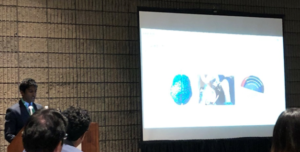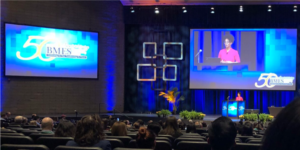Recap: Annual Meeting of the Biomedical Engineering Society
by Michael Raddatz (G2)
This October 17-20th, the Biomedical Engineering Society (BMES) had its annual meeting in Atlanta, Georgia. The conference addressed engineering solutions across the spectrum from sub-protein level biology to clinical medicine. Vanderbilt University was incredibly well-represented overall with 95 abstracts, the third most of any institution, and Professor Cynthia Reinhart-King winning the inaugural BMES mid-career award. Furthermore, the MSTP was also well represented, with oral presentations by Sumeeth Jonathan (G4) and Michael Raddatz (G2).


The most indelible impression of the conference was that of Yale Professor Anjelica Gonzalez delivering her plenary session on improving diversity in BME. Dr. Gonzalez began her talk by dispelling our assumed notions of progress. She pointed out that despite an exponential growth of “diversity initiatives” and other similar programming, the share of BME degrees conferred to underrepresented groups has fallen in the last 15 years – women of color are affected most drastically. As a woman of color herself, she told the story of her childhood in a single-parent household in Las Vegas where she learned to count cards and assisted her grandfather with water canal patterns for irrigation of farmlands. In highlighting her own unique path to engineering principles, she stressed to admissions officials and field leaders that we need not “make” engineers, but instead “look” for those who already think like engineers, a qualification which – unlike those that typically precede the former – does not fall so easily along lines of privilege. Similar to the discussions we had in our October CAB day organized by Kelsey McNew and Lizzie Flook (G2s), Dr. Gonzalez identified the lack of progress in diversity not just in program makeup, but also in ascension to leadership positions. Dr. Gonzalez attributed the lack of diversity in leadership in part to a lack of role models and visibility. The most poignant reminder of this visibility issue was in her interaction with an undergraduate. In a few moments of struggle and emotion, this woman thanked Prof. Gonzalez for being the first Latina woman of color to show her that success in this career was possible. With a hug and gracious thank you, Prof. Gonzalez lauded this undergraduate for her work already done and then sternly asked that she follow up the interaction with an email: “Don’t forget! I want to help you.”

As the conference continued for two more days, the homogeneity of some sessions was a tacit reminder of the culture that mandates the emergence of such incredible protagonists as Prof. Gonzalez. But for an hour on Thursday evening, Prof. Gonzalez simultaneously provided both incisive critique of our current efforts and fuel to the idea that with the right kind of leadership, we can do science that serves everyone.